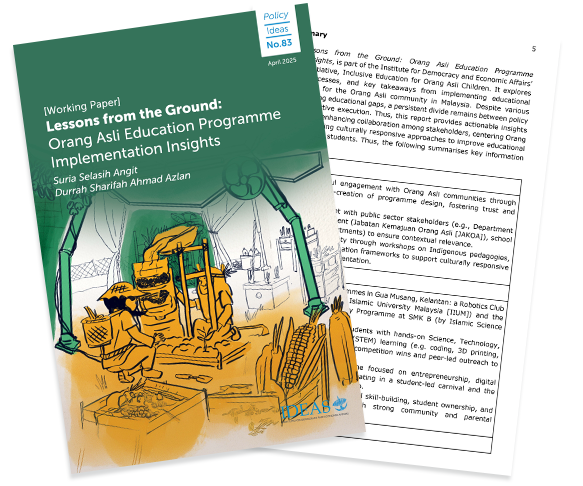Authors: Suria Selasih Angit and Durrah Sharifah Ahmad Azlan
The working paper explores the challenges, successes, and key takeaways from implementing educational programmes tailored for the Orang Asli community in Malaysia. It provides actionable insights to bridge this divide by enhancing collaboration among stakeholders, centering Orang Asli voices, and integrating culturally responsive approaches to improve educational outcomes for Orang Asli students. The following are findings from each phase of the implementation:
- Pre-implementation phase: Engaged Orang Asli communities through co-creation and consultations, aligned with public sector stakeholders for contextual relevance, and built implementer capacity through workshops on Indigenous pedagogies and impact-driven frameworks. A key lesson is that meaningful and continuous engagement of Orang Asli community members not only inculcates a sense of ownership and trust, but also strengthens school-community relationships and enhances parental motivation to support their children’s education, despite existing logistical and socioeconomic challenges. Additionally, equipping implementers with tools and knowledge to ensure that interventions are contextually relevant, impact-driven, and rooted in Indigenous perspectives is important.
- Implementation phase: Implemented two tailored programmes in two Orang Asli schools in Gua Musang, Kelantan. They are a STEM-focused Robotics programme and an entrepreneurship-driven I-Skilled Competency Programme, both promoting practical skills, student leadership, and culturally responsive learning with strong community involvement.
- Post-implementation phase: Post-implementation reflections highlighted stronger school-community relationships, increased parental involvement, and noticeable student growth in confidence, technical skills, and interest in STEM and entrepreneurship. While community collaboration and culturally responsive practices were praised, challenges such as logistical barriers, limited parent participation, and the need for more diverse programming underscored the importance of sustainability and deeper coordination with education authorities.
The lessons from this initiative highlight the transformative impact of community-led, culturally responsive education tailored to Orang Asli contexts. Moving forward, sustained collaboration and participatory approaches will be crucial in building an inclusive education ecosystem that truly empowers Orang Asli children.


